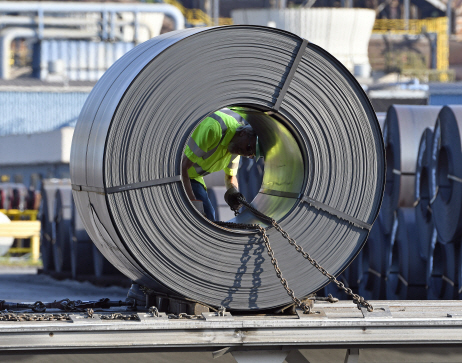South Korea’s steel industry is likely to see weak corporate earnings in the first quarter of this year due to a price surge in raw materials, a fall in steel prices and growing trade protectionism.
According to corporate tracker FnGuide, the market consensus forecast the nation’s largest steelmaker Posco would see operating profit fall 22 percent to reach 1.1 trillion won ($962 million) in the first quarter of this year.
During the same period, Hyundai-Steel and SeAH Besteel are estimated to see operating profits fall 20 percent and 34 percent to 234 billion won and 22.9 billion won respectively.
The weak outlook of the local steel industry is mainly the result of a surge in the price of iron ore, a key raw material of steel, industry watchers said.
In the January-March period, the average selling price of iron ore rose 13.8 percent to $80 from $70 in the fourth quarter of last year due to a supply issue in Brazil and Australia, two of the largest iron ore producers.
According to corporate tracker FnGuide, the market consensus forecast the nation’s largest steelmaker Posco would see operating profit fall 22 percent to reach 1.1 trillion won ($962 million) in the first quarter of this year.
During the same period, Hyundai-Steel and SeAH Besteel are estimated to see operating profits fall 20 percent and 34 percent to 234 billion won and 22.9 billion won respectively.
The weak outlook of the local steel industry is mainly the result of a surge in the price of iron ore, a key raw material of steel, industry watchers said.
In the January-March period, the average selling price of iron ore rose 13.8 percent to $80 from $70 in the fourth quarter of last year due to a supply issue in Brazil and Australia, two of the largest iron ore producers.

Last month, the collapse of a mine dam in Brazil left at least 160 people dead and led the nation to announce a plan to cut the production of iron ore by 40 million tons annually. This week, Australia cut its monthly iron ore exports by 13 percent in the wake of tropical cyclone Veronica.
Despite the surge in raw material prices, the price of carbon steel went down by 15,000 won per ton in the January-March period, driven by the supply glut of steel made in China.
Byun Jong-man, a researcher at NH Investment & Securities, said the profitability of Hyundai-Steel would significantly get worse if the average selling price of steel does not rise in the second quarter.
“The impact from the surge in iron ore prices due to the collapse of the Brazil dam will gain steam in the second quarter,” he said.
Growing protectionism is also adding to the problems of the local steel industry.
According to a local steel association, the volume of steel exports in February dropped 1.8 percent compared with the same month last year. It also fell 5.8 percent from the previous month.
Last month, the European Union imposed a safeguard measure on imported steel, including products made in Korea. In the same month, China decided to impose temporary anti-dumping measures on certain stainless steel imports from the EU, Japan, Korea and Indonesia.
Korean steelmakers are attempting to overcome the setback by calling on shipbuilders to raise the price of thick plates, a key material for shipbuilding.
Korean steelmakers and shipbuilders, including Hyundai Heavy Industries, Daewoo Shipbuilding & Marine Engineering and Samsung Heavy Industries, are currently negotiating over the price of thick plates.
Negotiations to set prices normally take place twice a year. Talks began at the end of last year but have been prolonged, as shipbuilders oppose the steelmakers’ proposal of an increase of 50,000 won per ton. Shipbuilders are calling for a price freeze on the grounds that the recovery of the industry is not certain.
Raising the price of thick plates by 50,000 won to 70,000 won per ton would lead to an additional 300 billion won cost burden for shipbuilders, according to the Korea Offshore & Shipbuilding Association.
By Shin Ji-hye (shinjh@heraldcorp.com)



![[Exclusive] Korean military set to ban iPhones over 'security' concerns](http://res.heraldm.com/phpwas/restmb_idxmake.php?idx=644&simg=/content/image/2024/04/23/20240423050599_0.jpg&u=20240423183955)




![[Pressure points] Leggings in public: Fashion statement or social faux pas?](http://res.heraldm.com/phpwas/restmb_idxmake.php?idx=644&simg=/content/image/2024/04/23/20240423050669_0.jpg&u=)

![[Herald Interview] 'Amid aging population, Korea to invite more young professionals from overseas'](http://res.heraldm.com/phpwas/restmb_idxmake.php?idx=644&simg=/content/image/2024/04/24/20240424050844_0.jpg&u=20240424200058)









